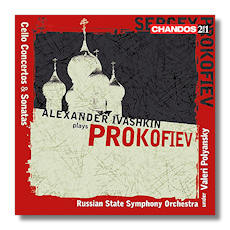
The Internet's Premier Classical Music Source
Related Links
- Prokofieff Reviews
- Latest Reviews
- More Reviews
-
By Composer
-
Collections
DVD & Blu-ray
Books
Concert Reviews
Articles/Interviews
Software
Audio
Search Amazon
Recommended Links
Site News
 CD Review
CD Review
Serge Prokofieff

Cello Concertos & Sonatas
- Symphony-Concerto in E minor, Op. 125
- Concerto for Cello & Orchestra in E minor, Op. 58
- Concertino for Cello & Orchestra in G minor, Op. 132 (unf.)
- Sonata in C Sharp minor for Solo Cello, Op. 134 (unfinished)
- Sonata for Cello & Piano in C Major, Op. 119
Alexander Ivashkin, cello
Tatyana Lazareva, piano
Russian State Symphony Orchestra/Valery Polyansky
Chandos 241-41 2CDs
This 2-disc set is a compilation of nearly all of Prokofieff's music for cello. The only work it lacks is the ten-minute Ballade for Cello and Piano, though there are also numerous transcriptions of other Prokofieff pieces in the repertory made by other hands. All of the works on this set are reissues, recorded between March, 1999 and September 2002. So they're recent and feature consistently detailed sound reproduction by Chandos.
I reviewed this performance of the popular Symphony-Concerto for Cello and Orchestra, in 2002, when it was issued on a disc with the Symphony #2. I considered Ivashkin's performance better than those of Ma, Schiff, Wallfisch and others, but suggested that Rostropovich might still hold sway in this work from his two recordings, the earlier one with Sargent and the latter with Ozawa. That judgment still holds true, though Ivashkin is fully convincing in this work both technically and interpretively, offering a strong second opinion. Incidentally, this work is considered the Rach 3 (or Prok 2) of cello concertos because of its immense difficulties. Those challenges are met with relative ease by this gifted cellist. I should add that Ivashkin has a rich, powerful tone and all-encompassing technique, and he possesses the interpretive acumen to fully capture the lyrical nature of this work and the others in the set. Prokofieff was especially lyrical and a bit mellow in his cello compositions, and while Ivashkin plays up those qualities quite well here, he has a deft way of imparting muscle and drama where appropriate.
He offers similar commitment in the Op. 58, a work about as long – 38:20 here, compared with 40:53 for the Op. 125. It is not quite as effective as the later reworking: the earlier work seems long-winded in spots and is somewhat less colorful. Still, it's nice to have this fine performance of it; and Polyansky here and in the Op. 125 draws splendid performances from the Russian State Symphony Orchestra.
The performance of the popular Sonata for Cello and Piano, Op. 119, is excellent, not least because of the fine work of the accompanist Tatyana Lazareva. In fact, the Ivashkin/Lazareva would be my first choice now in this piece, ahead of the splendid Harrell and Levine (once available on RCA) and the less-convincing Ma and Ax (Sony). The Concertino in G minor, Op. 132, was left incomplete by Prokofieff at his death. Kabalevsky and others made performing versions of the piece, but what's offered here is the realization by Vladimir Blok, which features a cadenza by Alfred Schittke. It is probably the best version of the work available, quite a contrast to the more heavily-scored Kabalevsky rendition. Ivashkin's performance of the piece is excellent, too, and once again Polyansky and company turn in fine work. The unfinished solo cello sonata, lasting 12:26 here, is a nice bonus. It consists of a single movement and must have been intended by the composer to be a major work: it is a mostly dark piece, valedictory in the contemplative lyricism of the main theme, but offering a burst of joy in the bouncy second theme. It was also completed by Blok and, as expected, is insightfully played by Ivashkin.
By the way, Igor Verprintsev is listed in the booklet as one of the recording producers and sound engineers. His name won't be familiar to most readers, but I remember him fondly: he was credited as sound engineer on many of those once-coveted Soviet-era recordings from the 1960s, issued on the Melodiya label. He's been around a long time! And his work here is splendid. But back to the main issue: this is a fine set and evidences the continued rise of Alexander Ivashkin. Highly recommended.
Copyright © 2008 by Robert Cummings




















